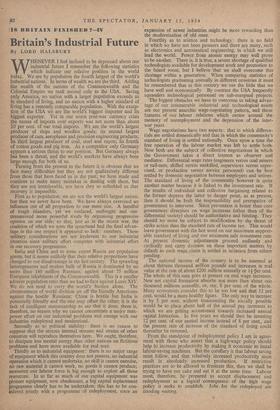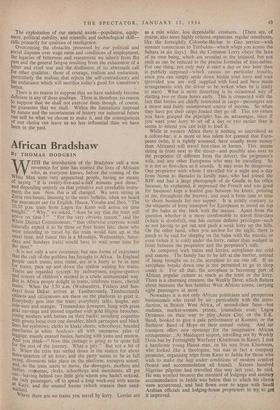Britain's Industrial Future
By LORD HALSBURY HENEVER I feel inclined to be depressed about our industrial future I remember the following statistics which indicate our relative position in the world today. We are by population the fourth largest of the world's industrial nations. In terms of wealth we are the third. Adding the wealth of the nations of the Commonwealth and the Colonial Empire we rank second only to the USA. Saving only America, no nation with a larger population exceeds us In standard of living, and no nation with a higher standard of living has a remotely comparable population. With the excep- tion of the USA we are the world's biggest importer and its biggest exporter. Yet in our worst post-war currency crisis the excess of imports over exports was not more than about 10 per cent. of our total imports. We are the world's largest producer of ships and woollen goods; its second largest producer of cars, aeroplanes and precision engineering products; its third largest producer of coal, steel and rayon; its fourth of cotton goods and pig iron. As a competitor only Germany appears a serious threat to our position. But Germany always has been a threat, and the world's markets have always been large enough for both of us.
Turning from the present to the future it is obvious that we face many difficulties but they are not qualitatively different from those that have faced us in the past; we have made and continue to make many mistakes in dealing with them, but they are not irretrievable, nor have they so enfeebled us that recovery is impossible.
First as to population; we are not the world's largest nation, but then we never have been. We have always exercised an influence out of all proportion to our mere size. A handful of tough islanders, yet we outfaced, outfought and out- manoeuvred more powerful rivals by organising progressive opinion on our side; so that, just as in the recent war; the coalition of which we were the spearhead had the final advan- tage in the one respect it appeared to lack : numbers. These military . considerations are not irrelevant to our industrial situation since military effort competes with industrial effort in our recovery programme.
India and China and to some extent Russia are population giants, but it seems unlikely that their relative proportions have changed to our disadvantage in the last century. The sprawling heterogeneous and restless bulk of Russia is dominated by no more than 160 million Russians, against about 75 million European inhabitants of the Commonwealth. This is a smaller adverse population ratio than we had to face against Louis XIV. We do not need to carry the world's burden alone. The circumstances of world division set off the friendly Americans against the hostile Russians; China is hostile but India is potentially friendly and the one may offset the other; it is the task of intelligent statesmanship to see that it does; there is, therefore, no reason why we cannot concentrate a major man- power effort on our industrial problems and emerge with our industries redeployed and modernised.
Secondly as to political stability : there is no reason to expansion of newer industries might be more rewarding than the modernisation of old ones.
Fourthly as to science and technology : there is no field in which we have not been pioneers and there are many, such as electronics and aeronautical engineering, in which we still lead the world. Power from atomic energy may well prove to be another. There is, it is true, a severe shortage of qualified technologists available for development work and promotion to the board room, but I believe that we shall overcome this shortage within a generation. When comparing statistics of technologists graduating annually in different countries it must be remembered that in this country we use the little that we have well and economically. By contrast the USA frequently squanders technological personnel on sub-marginal projects.
The biggest obstacles we have to overcome in taking advan- tage of our innumerable industrial and technological assets are our present anarchic wage-negotiating pattern, and those features of our labour relations which centre around the memory of unemployment and the depression of the inter- war years.
Wage negotiations have two aspects : that in which differen- tials are settled domestically and that in which the community's standard of living is settled nationally. Once upon a time the free operation of the labour market was left to settle both. Now both are the subject of collective negotiations in which the Government takes a direct interest as observer and mediator. Differential wage rates (engineers versus coal miners or rail-men, skilled versus unskilled, supervisors versus super- vised, or production versus service personnel) can be best settled by domestic negotiation between employers and unions. The standard of living of the community however is quite another matter because it is linked to the investment rate. If the results of individual and collective bargaining related to the former depress the latter to danger point, as at present, then it should be both the responsibility and prerogative of government to intervene. Since prevention is better than cure government directives on wage increases (other than of the differential variety) should be authoritative and binding. They should no more be subject to modification by the threat of strike action than the standard rate of income tax. This would leave government with the last word on our maximum support- able standard of living and our minimum safe investment rate. At present domestic adjustments proceed endlessly and cyclically and carry decision on these important matters by default as each wage claim is settled in isolation from others pending.
The national income of the country is to be assessed at about thirteen thousand million pounds and increases in real value at the rate of about £200 million annually or li•fer cent. The whole of this sum goes at present on real wage increases. New net capital formation absorbs not more than about one thousand millions annually, or, say, 8 per cent. of the whole. Many economists consider this to be too low and that 12 per cent. would be a more healthy figure. The only way to increase it by 5 per oent. without transcending the socially possible would be to place about half of the annual pay increases to which we are getting accustomed towards increased annual capital formation. In five years we should then be investing 12 per cent. of our annual income instead of 8 per cent., and the present rate of increase of the standard of living could thereafter be resumed.
From the standpoint of redeployment policy I am in agree- ment with those who assert that a high-wage policy should help to increase productivity by making it economic to instal labour-saving machines. But the corollary is that labour saving must follow, and that relatively increased productivity must result in absolutely increased production. If restrictive practices are to be allowed to frustrate this, then we shall be trying to have our cake and eat it at the same time. Labour must, therefore, be prepared to accept displacement and redeployment as a logical consequence of the high wage policy it seeks to establish. Jobs for the redeployed are standing waiting. The exploitation of our natural assets—population, equip- ment, political stability, and scientific and technological skill— calls primarily for qualities of intelligence. Overcoming the obstacles presented by our political and social disputes over wage rates and conditions of employment, the legacies of bitterness and resentment we inherit from the past and the general fatigue resulting from the exhaustion of a bitter and cruel war and the disillusion of its aftermath call for other qualities: those of courage, realism and endurance, Particularly the realism that rejects the self-contradictory and the endurance which will sacrifice today's good for tomorrow's better.
There is no reason to suppose that we have suddenly become deficient in any of these qualities. There is, therefore, no reason to suppose that we shall not exercise them though, of course, po guarantee that we shall. Within the limitations imposed by nature and the uncertainties of history our industrial future can still be what we choose to make it, and the consequences of our choice can leave us no less influential than we have been in the past.



































 Previous page
Previous page